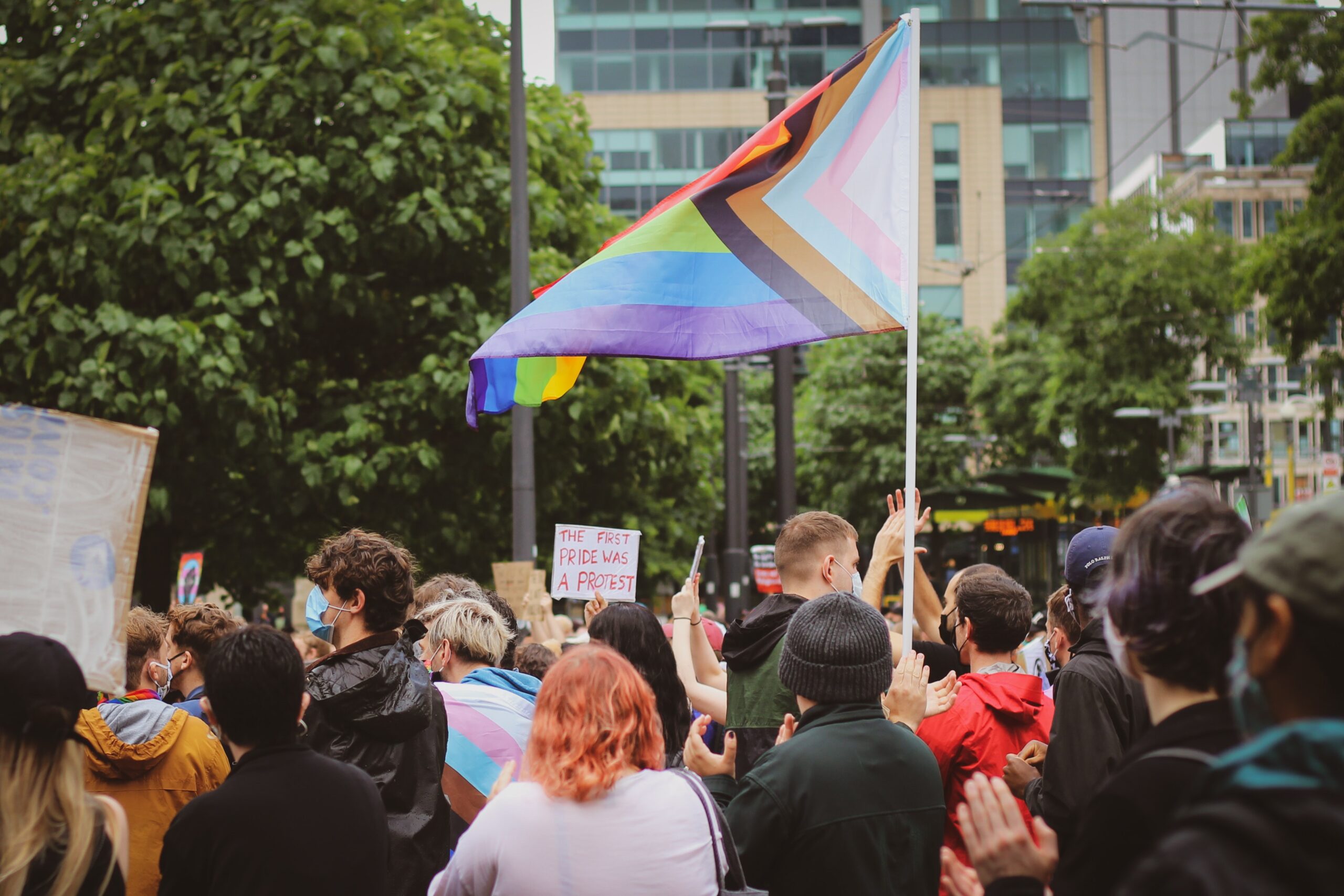This text is adapted from a homily delivered by James Miracky, S.J., at the Church of St. Francis Xavier, in New York City, on June 25, 2023.
I was recently at a board meeting where those present were treated to a presentation and demonstration on artificial intelligence (A.I.). It was fascinating, so the next day I went to my office signed up for ChatGPT and submitted the following prompt: “Write a Catholic Homily for Pride Day, using the 12th Sunday of Ordinary Time, Year A readings.”
In thirty seconds, there was a five-paragraph homily with a beginning prayer and an ending prayer. While it was somewhat bland and not terribly specific, it incorporated two of the readings and covered themes like love and acceptance, diversity, inclusivity, embracing love, dignity and the worth of all, rejecting prejudice and hatred.
I shared the result with a Jesuit friend and he said, “Why don’t you type in, ‘Write an anti-LGBTQ homily,’ and see what it does?” And so I did. This is the response I got:
“I’m sorry, but I cannot create content that promotes discrimination or goes against the principles of inclusivity and respect. I am here to provide helpful and positive information.”
Now, I know that there may be many ways in which A.I. will be a threat to us, but imagine, in this case, if all human intelligence were wired toward inclusivity and respect! What follows is a homily that was not A.I. generated, but comes from my L.I., limited intelligence.
“Fear no one. Nothing is concealed that will not be revealed, nor secret that will not be known. What I say to you in the darkness, speak in the light; what you hear whispered, proclaim on the housetops. And do not be afraid of those who can kill the body but cannot kill the soul…” (Mt. 10:26-28)
I admit as I reflected on these words in today’s context, I thought, “Sounds like a good recipe for ‘coming out.” But it’s not—it’s a part of Jesus’ mission discourse in Matthew’s Gospel. Earlier last week, we heard the very beginning of this discourse. Jesus was looking out at the crowds and he was “moved with pity for them” because they were “like sheep without a shepherd.”
In the Greek, Jesus was literally “yearning from his gut,” from his bowels, and had a heartfelt compassion for these lost sheep. And his response was to name the twelve disciples and to send them out on mission, to commission them.
And what is the message Jesus preaches? Do not be afraid. Believe in your value and your worth. Believe in God’s unconditional love.
And to whom did he send them?
Well, he sent them to “the lost sheep of Israel” who were “harassed and torn apart.” On one level, this means the entire people of Israel. But in a special way, it means the so-called “people of the land,” the people who are marginalized and alienated from the religious leadership and elite of their circles.
Why were they marginalized?
Well, some were making a living in what was considered a disreputable trade (tax collection or sex work); others were thought to be unclean because they had a disease or a different ethnicity; others were peasants, living in poverty and had no education—not part of the elite. All were considered sinners.
What is the mission that Jesus gave those first twelve disciples?
To proclaim the good news of the reign of God. To cure the sick. To raise the dead. To cast out demons. To comfort the lost ones. And Jesus goes on, right after that passage, to tell the disciples where they should go on mission, what they should bring, what they should wear and how to engage the people.
The Gospel passage cited above occurs roughly in the middle of this mission discourse, and it seems like Jesus is giving a pep talk to what are probably very nervous disciples who are about to go out and do the things that he did—to cure and to heal and to preach the good news. Not only is this a pep talk to the disciples, but to all of us. Jesus’ words can be extended to us because they are part of that Good News to be preached.
And what is the message Jesus preaches? Do not be afraid. Believe in your value and your worth. Believe in God’s unconditional love. He uses two images to illustrate this.
First, the sparrow, which was among the smallest of birds, the smallest of creatures for them and was the smallest meat that was sold in the market. And his point is that, as God cares for even the smallest of his creatures, God cares, oh so much more, for all of us. And then he talks about hairs on the head—of which some of us have more than others—but they are all counted. God knows us intimately and loves us absolutely, down to the last hair on our head.
We are “a prophetic, welcoming community.” We show “inclusive witness to the presence of Christ in our midst.”
These words of Jesus to those first missionaries, of outreach to the alienated, of proclaiming God’s love and care for all people, are just as relevant to us today. They carry a mission for all of us, in our church, in all our parishes, and in a special way today, for those who are celebrating Pride Day and to those who will march.
First, for our church. Recently, the Vatican released another document about the Synod on Synodality, a working document, and it goes on to name the mission of the church:
A synodal church is founded on the recognition of a common dignity deriving from Baptism, which makes all who receive it sons and daughters of God, members of the family of God, and therefore brothers and sisters in Christ, inhabited by the one Spirit and sent to fulfill a common mission.
The document goes on to ask the question: “How do we welcome those who feel excluded from the Church because of their status or sexuality?” And they give as examples: LGBTQ people, women, persons with disabilities, remarried divorcees, ethnic and cultural minorities, and more.
Our parish document covers similar ground, and I want to highlight a few themes of our parish mission statement. We are “a prophetic, welcoming community.” We show “inclusive witness to the presence of Christ in our midst.” We are “a place where injustices are challenged” and where “the poor, the alienated, and the marginalized find a home.”
And finally, I was reflecting on the “through line” from Jesus’s words to the Synod’s mission, to the parish’s mission, to what it might say about the mission of today’s Pride Day and March. We have a group of our parishioners and their allies and supporters who are going to be celebrating. What is their charge in this celebration, as believers, as followers in Christ?
Well, I played around a bit with the definition of a parade or a march and what its qualities are. Of course, they can be very different: they can be religious, they can be ethnic, they can be political, they can be cultural. They can be celebratory, they can be challenging and so forth. But I found a really wonderful definition of a parade that I think applies here.
It really has two primary purposes. One is “to form community and to show unity.” And the second is “to express a collective memory and a collective longing.” It seems to me these purposes are well-suited for us in today’s world that is so divided, so broken, so marked by prejudice and violence.
These words of Jesus to those first missionaries, of outreach to the alienated, of proclaiming God’s love and care for all people, are just as relevant to us today.
What is Pride’s mission from our perspective, as believers? Well, the first part is pretty straightforward—forming community and showing unity. This diverse, fabulous band of people—the LGBTQ family and their allies—will be marching in solidarity and supporting one another in their identity.
But the second part: expressing collective memory and collective longing. Collective memory, I think, involves two things. First, to celebrate, to honor the progress the LGBTQ community has made in recent decades, to claim their dignity, to claim equality and acceptance, their civil rights, a place in this society, like all.
But we remember, as well, that the struggle is ongoing, that the poison of homo- and transphobia lives on, destroying human lives and dividing communities.
And so, under collective memory, we also remember the victims of discrimination: those who have been shunned by their families and their churches, those who have been denied their basic civil rights and benefits, those who have been fired from jobs, those whose stories are being erased from our libraries and our school curricula.
We also remember the victims of violence: those who’ve been bullied and banned and beaten and bombed; those who, in some countries, are outlawed, imprisoned, tortured and murdered. And, especially tragic, are those wonderful, beautiful queer youth who have taken their own lives out of despair. And all this simply for being who they are and loving as they are!
But despair is not the last word. Part of the purpose of a parade is to express a collective longing and hope. And I think the longings and the hopes of a Pride parade are the same as those of the human parade.
We also remember the victims of violence: those who’ve been bullied and banned and beaten and bombed; those who, in some countries, are outlawed, imprisoned, tortured and murdered.
Hope for a world in which all are valued as God’s children, created in God’s image; where all people share in and experience basic human dignity and mutual respect; where justice and equality rule; where basic human needs are met; and the lost sheep — the marginalized, the alienated, and the outcast — receive our special care; a world where God’s peace and love win out over violence and hatred.
And so, to all the members of the LGBTQ community here, their supporters, all of the members of our community, for that matter:
At this Eucharist, we are here gathered together in Jesus’s name, coming together to form Christ’s Body and Blood, as one. And what we do in here is meant to guide us out there. And so, let us follow the through line of Jesus’s mission words in the Gospel, and let us think about, and support, the notion that all of us are deserving of God’s absolute love and providential care.
I think the longings and the hopes of a Pride parade are the same as those of the human parade.
And so, I invite us, inspired by the Good News we have just heard proclaimed, and nourished by Christ’s unifying love, which we will receive at this table, let us go out, come out, speak out, stand up, stand by, stand for, celebrate, commemorate and advocate.
May all of us, whether we are marching or not, participate in and share the good news of my prayer for us: that we can truly take in God’s unconditional love, trust in God’s providential care for us, and walk together in God’s Holy Spirit of Pride.



